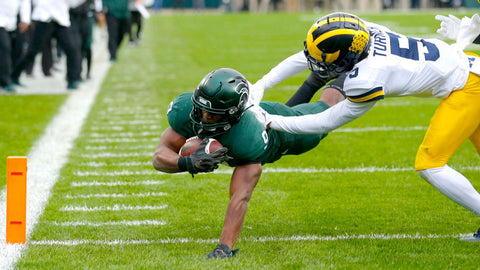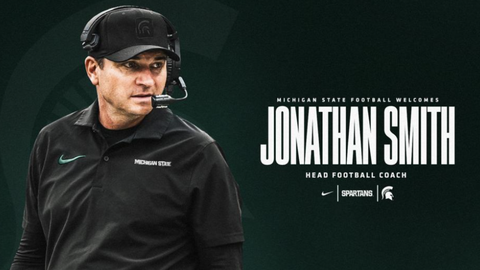In honor of Michigan State football’s upcoming game against Michigan, this week’s Flashback Friday recounts MSU’s victory against Michigan in 2021.
One of the most highly-anticipated rivalry games between the two schools, the 2021 Michigan State-Michigan game did not disappoint. Despite starting the season unranked in the Associated Press Top-25, MSU won every game on its schedule until Michigan to rise to No. 8 in the nation. This included wins against No. 24 Miami, Nebraska and Indiana.
Meanwhile, Michigan had just fired defensive coordinator Don Brown the season prior. The Wolverines, like MSU, entered the season unranked after a disappointing 2020 campaign. With Harbaugh in his seventh season as Michigan head coach, the pressure began to mount. Michigan began the season undefeated as well, winning games against Washington and Wisconsin.
The Wolverines entered the matchup ranked No. 6 with the Spartans ranked No. 8.
Michigan jumped out to an early 10-0 lead after a 93-yard touchdown by wide receiver Andrel Anthony and a field goal by kicker Jake Moody. Michigan was able to score a touchdown of its own when running back Kenneth Walker III scored the first of his five touchdowns on a 27-yard run.
One of the most controversial plays of the game was a fumble on the field by Michigan State quarterback Payton Thorne, recovered for a touchdown by Michigan linebacker Adian Hutchinson. After review, officials determined that Thorne’s knee was down prior to fumbling the football.
Instead of jumping out to a 27-14 lead, Michigan was up 23-14 at halftime. The Wolverines had settled for field goals on three occasions. Anthony caught both touchdowns for Michigan and Walker scored both of MSU’s touchdowns.
Scoring in the second half was opened by Michigan wide receiver Mike Sainristil, giving the Wolverines a 30-14 cushion. But the game was far from over.
Michigan State responded on the ensuing drive, starting at its own 33 yard line. On the drive, Thorne was 5-for-5 for 58 yards while Walker ran the ball three times. The drive also included a conversion on fourth down to wide receiver Jayden Reed and a two-point conversion to wide receiver Tre Mosley.
The Wolverines were only able to muster seven plays and 28 total yards before a punt on fourth down. MSU started its next drive from the 14 yard line.
On the ensuing touchdown drive, Thorne began with two consecutive incompletions until a timeout was called by MSU. After the timeout, Thorne went 3-for-5 and 21 passing yards, but the big play was a 58-yard touchdown run by Walker – his fourth of the game. Thorne threw to Reed for another two-point conversion. MSU had tied the game 30-30.
Michigan settled for another field goal, giving the team a 33-30 advantage when Michigan quarterback Cade McNamara couldn’t convert on a 3rd-and-8. It was Moody’s fourth field goal of the game. By contrast, Michigan State had attempted zero field goals during the entire game.
The Spartans punted the ball away after three plays and losing four yards on the next drive.
After MSU’s punt, Michigan was set to take over from its own 45 yard line. However, true freshman quarterback J.J. McCarthy fumbled on the first play of the drive and defensive end Jacub Panasiuk recovered. The Spartans scored on the following drive, giving MSU a 37-33 lead.
Michigan turned the ball over on downs, needing a touchdown from the MSU 31 yard line. Instead, the Spartans took over from there and punted themselves. On the final drive of the game, McNamara threw an interception, which Charles Brantley caught, and MSU won 37-33.
The Spartans won the game, increasing their record to 8-0. Michigan fell to 7-1.
During the following week, Michigan State lost to Purdue, the first of its two losses during the season (the other against Ohio State). Michigan won the rest of its regular season games and found itself in the College Football Playoff against Georgia, which the team lost 34-11.
The fight for the Paul Bunyan Trophy will not only be remembered for Walker’s five touchdowns or Thorne and Reed’s connections on fourth down. It will also be remembered as a massive celebration following a half-decade of disappointment.
Additionally, some saw the season as a missed opportunity for Michigan State, because of its loss the following week against Purdue. Due to the Big Ten’s tiebreaking rules, if all three teams (Michigan State, Michigan and Ohio State) had finished the season with only one loss, Ohio State – crucially, not Michigan – would’ve still been sent to the Big Ten Championship in Indianapolis. (The tiebreaker that would decide the fate of all three teams was OSU’s strength of its non-divisional schedule).
Regardless, the season was a reminder that a well-coached team with limited recruiting resources can still compete at the top of the Big Ten.





Comments (0)
There are no comments for this article. Be the first one to leave a message!